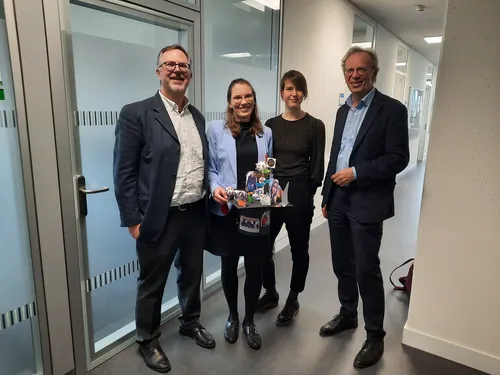Julia Klüpfel successfully defended her PhD Theasis with summa cum laude - Congratulations!

"Development of Rapid Automated Chemiluminescence Microarray Immunoassays for SARS-CoV-2 Serological Assessments"
Abstract
The SARS-CoV-2 pandemic has not only caused global restrictions but also massive research effort since its outbreak in 2020. By developing serological diagnostic tools using the MCR analytical platform that had never previously been used for diagnostic assessments in humans, this work contributed to the following developments in this area.
First, an automated flow-based chemiluminescence microarray immunoassay (CL-MIA) was developed for the detection of IgG antibodies against different SARS-CoV-2 antigens – receptor binding domain (RBD), spike (S1) and nucleocapsid (N) protein. It enabled the multiplex determination of antibodies within eight minutes. For this assay, performed on amino-modified glass microarray chips with covalently bound recombinant antigens, a sensitivity and specificity of 100% was achieved, keeping pace with the best commercial assays.
The next development step was an optimization towards point-of-care applications, e.g. to control the efficiency of the newly developed vaccines. For this purpose, polycarbonate microarray chips with a carboxy-modified surface were used, which enabled significantly shorter production times. Moreover, the injection process was optimized so that the measurement time could be reduced by 50% and the sample volume by 90%. This assay proved to be effective for retrospective detection of asymptomatic, unnoticed infections, but also for seromonitoring after vaccinations. In addition, a novel assay for sequential detection of IgM and IgG antibodies was developed that could be used to study the time course of the immune response.
During the course of the pandemic, it became clear that neutralizing antibodies will play an important role in the clinical evaluation of immunity to SARS-CoV-2. These antibodies prevent the virus from entering the cell via the ACE2 receptor but for their determination usually active virus is necessary, thus the requirement for biosafety level 3 laboratories. The use of recombinant proteins allows the design of surrogate neutralization assays that do without active virus. Therefore, a competitive surrogate neutralization assay was developed in this dissertation, enabling results notably faster than commonly used neutralization assays with a measurement time of about five minutes. This allowed measurement of the interaction between RBD and ACE2 and inhibition of the same by neutralizing antibodies. Comparison of patient cohort measurements with several alternative neutralization assays showed very good agreement for the competitive CL-MIA.
Thus, this dissertation contributes to the highly topical issue of rapid serological tests for SARS-CoV-2. The developed assays stand out by the use of native recombinant antigens on optimized microarray chips enabling low unspecific binding. The microfluidic analysis platform MCR allows for rapid and automated assay procedures that can find widespread application for a variety of serological assays in the future. Their flexible adaptability offers countless opportunities for rapid development of fast antibody tests for any disease.